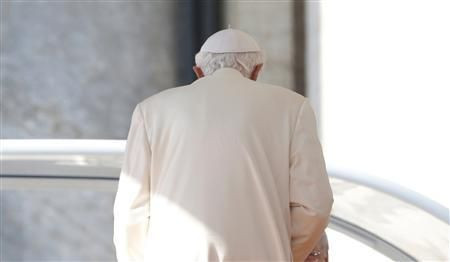Pope Benedict XVI Resigns: What Happens Now?

On the last day of Pope Benedict XVI’s eight-year reign as the head of the Roman Catholic Church, the College of Cardinals will start preparing for the process of selecting his successor.
The august body, called a conclave, will comprise 115 cardinals (67 of whom were appointed by Benedict himself) will gather in the Sistine Chapel to vote on the new head of the church.
Under a rule amended by Benedict himself, the conclave will not have to wait the customary 15 days after the papacy becomes vacant to choose a new successor, which means the cardinals can meet prior to March 15.
Vatican officials have stated that the earliest the conclave would commence is Friday, but that date is not certain.
To be elected pope, the cardinal candidate must have two-thirds majority support to ascend to the highest position in the church.
During the interregnum -- that is, the period between two popes -- Benedict’s deputy, Vatican Secretary of State Cardinal Tarcisio Bertone, will “have temporary charge of the world's 1.2 billion Roman Catholics,” the BBC reported.
According to the Catholic leader, Bertone will have the title of "camerlengo" (or chamberlain) of the Holy Roman Church, “which means he is charged with administering the temporal goods of the church.”
Meanwhile, Benedict’s decision to quit as pope has raised a number of unusual and complex issues -- a manifestation of the fact that no pope has resigned in almost 600 years.
Benedict, who will assume the title of Pope Emeritus and also retain the moniker His Holiness, will also keep the honorific Pope Benedict rather than revert to his given name, Joseph Ratzinger (similar to how former U.S. presidents keep that title even after they’re long out of office).
Michael Walsh, a papal historian, wrote that “there are legitimate questions about his title of pontiff emeritus. It opens him to accusations of pride, when he has hitherto been widely praised for his humility.”
Moreover, Benedict will still live in Vatican City (after spending about three months in the papal residence at Castel Gandolfo, just south of Rome), although he has stated he will live in seclusion, reading books (he reportedly has some 20,000 in his papal apartment), perhaps writing his memoirs, tending to prayer and playing with his beloved cats.
What Benedict will wear will also be a significant issue; although he will continue to sport the traditional papal white cassock (rather than the black garments worn by mere priests or red adorned by cardinals), he will not don any hats, nor his famous red shoes or any other such vain accoutrements.
More symbolically, his papal gold ring will be destroyed (by a silver hammer, no less) while his personal seal will be defaced.
Benedict will have no officials duties in the Vatican (and will not participate in the conclave to elect his successor), but he will be keeping the services of Archbishop Georg Gaenswein as his private secretary at least for a while. Gaenswein is also the head of the papal household, suggesting Benedict’s links to the new papal regime could be significant.
On a lesser note, Benedict’s Twitter account (@Pontifex) will be closed down, although, as of Thursday morning (New York time), he was still tweeting. His most recent message on the English language version: “Thank you for your love and support. May you always experience the joy that comes from putting Christ at the center of your lives.”
The Pope’s English-language Twitter account has almost 1.6 million followers. His other Twitter accounts are in Latin, German, Spanish, Portuguese, Polish, Italian, French and even Arabic.
© Copyright IBTimes 2024. All rights reserved.




















